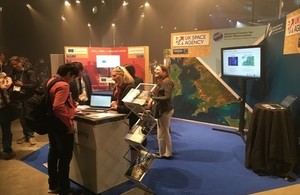World leading UK Earth Observation industry showcased at Living Planet Symposium
The biggest Earth Observation conference in the world kicks off in Milan today (Monday 13 May), with around 4,500 delegates expected with the UK Space Agency in attendance.

The Living Planet Symposium is held every three years and focuses on the contribution of Earth Observation to science and society, disruptive technologies and new opportunities for the public and private sectors.
The UK Space Agency’s Head of Earth Observation and Climate, Beth Greenaway, will present the agency’s ambitious vision for Earth Observation through to 2040 as part of the main programme today (Monday 13 May).
Beth Greenaway, Head of Earth Observation and Climate, said:
We are proud to be sponsoring ESA’s Living Planet Symposium which is an important event in the Earth Observation calendar.
The strength and depth of UK science and industry will be showcased throughout the week and we look forward to highlighting important collaborations, through ESA and others, which underpin this strength.
The event is organised by the European Space Agency (ESA) and is this year being supported by the Italian Space Agency. The UK Space Agency is a sponsor of the event having hosted the 2013 event in Edinburgh.
The UK has world-leading satellite Earth Observation capability, from developing and building missions to managing and exploiting data and creating trusted applications and services. Earth Observation services are already supporting £92 billion worth of the wider UK economy and are growing rapidly.
As part of the Government’s Industrial Strategy, the UK Space Agency is building on this strength while growing our share of the global space market.
The UK Space Agency is also hosting a stand in the exhibition space throughout the week showcasing the UK’s collaboration in international Earth Observation missions, programmes and organisations. The exhibition stand will include presentations from UK scientists, industry and project partners covering a range of issues such as land and sea surface temperature, biomass and deforestation, and innovative technology such as video from space.
In March the UK Space Agency revealed that every £1 of public spending generates up to £4 in value for the recipients in the space industry, with additional benefits to the UK economy.